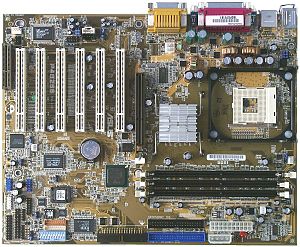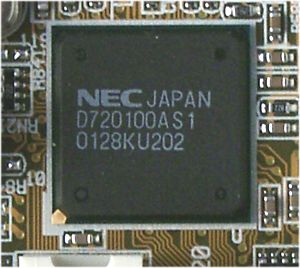ASUS P4B266 (i845D) Mainboard
|

This board was first to appear on the i845D chipset.
Accessories:
- Package: a new design for this company;
- Documentation: a user manual in English; a short installation manual -
in 11 languages, a sticker with brief description of functional connectors
and switches;
- Cables: 1 ATA66/100, 1 ATA33 and 1 FDD;
- Bracket with 4 USB ports;
- Bracket with 2 USB ports;
- Bracket with gold-plated SPDIF connectors;
- CD with software including:
- drivers;
- Adobe Acrobat Reader;
- Winbond Voice Edit;
- ASUS Update - for downloading a new BIOS version and updating it from the
Windows;
- ASUS Logo;
- PowerPlayer SE;
- PowerDVD;
- VideoLive Mail;
- ASUS Hotkey;
- Intel LDCM (LANDesk Client Manager);
- PC-Cillin 2000;
- ASUS PCProbe;
- Screensaver.

The layout is simple and convenient, only audio-ins are in front of
PCI slots. It's not difficult to reach switches and jumpers.
The 3-channel switching voltage regulator incorporates 7 capacitors
of 3300 uF and 3 of 1200 uF.
The following controllers are integrated: C-Media CMI8738/PCI-6ch-MX
audio one supporting a 5.1 acoustic system; USB 2.0 bus one on the NEC
D720100AS1 having 4 ports and back compatible with USB 1.1 devices. The
ITE I/O controller (IT8708F-A) provides for smart card and MMC and SD card
readers. Besides, there are connectors for iPanel and front audio-outs.

The board incorporates the following ASUS technologies: MyLogo (changes
backdrops); EZ Plug (created for power units which do not comply with the
ATX 2.03 standard and allows applying additional +12 V); POST Reporter
(reports about problems occurred in course of booting; there are 9 languages
available, and it's possible load WAV files into the EEPROM).
Non-unsoldered connectors: RJ45 connector and a chip which realizes
network capabilities of the chipset.
The system monitoring is supported by the ASIC ASB100 Bach chip. Processor
voltage (+/-3.3, +/-5 and +/-12 V), speed of 3 fans and temperatures
of the processor (a built-in sensor) and the board (a built-in sensor)
can be controlled. There are 3 connectors for adjustable connection of
fans.
Brief characteristics of the board: memory slots - 3 DDR SDRAM;
expansion slots - AGP/ 6 PCI/ CNR; I/O ports - 2 COM/ LPT/ 2 PS/2/ 4 USB
1.1/ 4 USB 2.0; dimensions - 305x240 mm.
Adjustment can be carried out with:
| jumpers and switches |
Jumper to choose an operating mode |
Jumper/JumperFree |
| Jumpers to change a CPU multiplier and a FSB frequency |
x8-x24; 100, 105, 111, 120, 125, 133 MHz |
| Jumper to make possible to start up a computer with a PS/2
keyboard |
 |
| Jumper to choose memory voltage |
2.5, 2.6, 2.7 V |
| OverVoltage jumper to enlarge the range of CPU voltages |
 |
| Jumper to make possible to start up a computer with USB
devices |
 |
| Jumper to choose an integrated speaker or LineOut for POST
Reporter |
 |
| Jumper to adjust a Bass/Center channel |
 |
| Jumper to enable/disable a USB 2.0 controller |
 |
| BIOS based on v6.00 from Award |
Setup of memory timings |
+ |
CAS Latency, RAS to CAS Delay, RAS Precharge Delay, Active Precharge
Delay, Idle Timer |
| Setup of memory frequency |
+ |
DDR200/DDR266 |
| Setup of AGP bus |
+ |
 |
| Setup of PCI bus |
+ |
 |
| Changeable scaler of AGP and PCI buses |
- |
 |
| Manual assignment of interrupts |
+ |
 |
| Changeable FSB frequency |
+ |
In 1 MHz increments, 100-200 MHz |
| Changeable CPU multiplier |
+ |
x8-x50 |
| Changeable core voltage |
+ |
Normal:
Willamette 1.75-1.85 V
Northwood 1.5-1.7 V
OverVoltage:
Willamette 1.75-2.1 V
Northwood 1.5-1.75 V
0.025 V steps |
| Changeable memory voltage |
- |
 |
| Changeable chipset voltage |
- |
 |
| Changeable AGP bus voltage |
- |
 |
We used the latest available version of the BIOS - 1005.
The board is quite good; and it may become as popular as P2B and P3B-F.
The only disadvantage is a high price.
Test results:
Write a comment below. No registration needed!
|
|
 |
|
|
|



